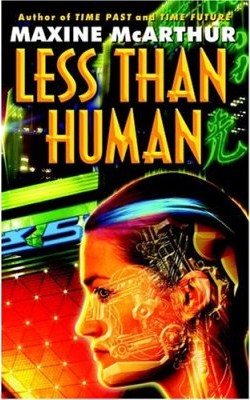The 2005 Snapshot
Australian Speculative Fiction: writers, editors, publishers
Maxine McArthur
Maxine McArthur
Interview by Ben Peek
 Maxine McArthur's latest novel is the Aurealis Award winning Less Than Human.
Maxine McArthur's latest novel is the Aurealis Award winning Less Than Human.
1) You got your start by winning the George Turner Award for Best Unpublished Manuscript in 1999 for your novel Time Future. The award died a year after that, you are the only winner so far to maintain your profile and publications with a publishing house since then. It was, however, not until 2002 that your sequel Time Past was published in the States, one year after the reprint of of Time Future for an American audience. Were there difficulties during this time in selling it, or rather the natural time it took you to write it?
Time Past appeared both here and in the States in 2002, so I'm just a slow writer. It took me about two years to write it, and then there was the usual lag before it actually appeared in print. I do recall that the editor took a long time--about half a year, at least--to get back to me with the first set of edits. Fortunately by then I had rewritten most of the bits she hated, so the delay was lucky in that sense. I wouldn't say there were no difficulties selling the book, however. It was a gamble for the publishers, as second novels often are, especially given that winning a prize can give writers a false sense of their own ability and importance. I was reminded of this at Worldcon in Melbourne, when Random put on a wonderful launch for Time Future, an absolute dream. "Enjoy it while you can," a certain fantasy author told me, "they won't do this for your next one." And she was right.
2) There is, at times, a tendency to not take authors who are published through awards seriously. What's your experience being a George Turner winning, and have you encountered anything like that?
Are you talking about the total strangers who kept shooting me dirty looks at Worldcon, whom I found out later were Turner runners-up? Seriously, before I published Time Future I had no contact with the speculative fiction scene in Australia, and knew very little about the literary scene in general. I'd been out of the country for 16 years, remember. I don't think I have had any experience of this sort, but then, perhaps my idea of being taken seriously is different to yours. If you mean have I ever felt looked-down-upon or excluded, the answer is a resounding No. From my first moments at Worldcon, when a kindly fan took pity on my gauchness and introduced me in quick succession to Jonathan Strahan and Dave Luckett, to the incredibly emotional finale at Conflux, and in between, I have never felt anything other than welcome in the Australian specific community. Love you all, darlings. On the other hand, I think that people are right to regard award winners with a certain amount of skepticism, especially if, like myself, they have written nothing previously. It is only natural to wonder if an award winner has it in her to produce something else that's readable, and for a winner to expect to be treated like a pro when she's had one sale (and that due to the award), is unreasonable hubris.
3) In addition to your writing, you're very active in the CSFG, to the point where you co-edited (with Donna Hanson) the anthology Encounters last year. Being as you have a lot of contact with emerging authors, how do you see the quality of the scene overall?
For short stories, very high. We chose 22 stories out of 95 submissions for Encounters, and we could have easily chosen another twenty or more for a separate anthology. One of the most difficult things I've ever done was turn down wonderful stories that simply didn't fit, for whatever reason. I think the quality of writing itself is high--lots of people are real stylists. I read a US magazine like Asimov's or F&SF, and frankly, half of those stories don't grab me anything as much as stories in Agog! or ASIM or Aurealis. I do wish we had a few more hard/straight SF stories published, but that's just a personal preference. The other thing I miss in some stories is a sense of the what the writer wanted to say, a feeling that the story was significant for him/her. It's great that new names keep appearing in the magazines, that new writers are polishing their craft and giving readers more variety. The proliferation of short story markets has helped this, I'm sure.
For novels, I can't really comment, as I haven't read many of the fantasy novels published here recently. They just don't appeal to me. And there aren't many SF novels published here, although I enjoy much of the work published overseas by Australian authors--Bishop, McMullen, de Pierres...
4) You're dead. Power cables really do give you cancer, but when they break and fall and rush through the air towards you... well, you had two caskets. A tiny one for you head. A larger one for your body. Still you're dead. You go to Heaven and you see God. You say?
Either I go down to hell, or you bring my body up here.
5) Favourite swear word?
That would have to be 'shit'. With a long 'sh', short 'i', and biting the 't'. I spent many years disciplining myself not to use anything stronger in front of the children, and now of course they're teenagers and fucking and cunting all over the place, and I'm stuck with my little s-word habit.
©2006 Go to top

